Business analysts are the people in your organization who are asking ‘why’ – why a process happens the way it does – to understand what the business needs from its technology.
The business analyst role has existed for some time in the Salesforce ecosystem, however, the conversation has picked up pace with Salesforce releasing the Business Analyst certification (2022) and Trailhead modules for this career path.
In this guide we’ll dive into Salesforce Business Analyst goals, responsibilities, and tasks – and why Salesforce BAs are in high demand. Then, explore the different ‘flavors’ of Business Analysts in the Salesforce ecosystem. We’ll combine valuable insight from the influencers in the industry (CeCe Adams and Toni V. Martin) to inspire you, and boost your SFBA career momentum.
What Is a Salesforce Business Analyst?
A Salesforce Business Analyst, in a nutshell, acts as a translator. The business wants to accomplish something and we know it is going to be accomplished using Salesforce. So, a BA’s job is to translate what the business wants to do, into how it actually gets done.
“To me, a BA is an admin that is empowered to ask “Why” on a deeper level. We need to be able to understand and effectively communicate both the “Why” and the “How’ to stakeholders so that everyone’s goal is achieved.”
CeCe Adams, 22x Certified Solution Architect
Business analyst goals
Jordan Pearson summarized a business analyst’s main goals perfectly:
- Performance (+ Minimization of Technical Debt): Maximizing the value of a system through architecture best practices and technical specifications. This allows your users to utilize Salesforce without worrying about technical faults, such as unreliable functionality or records loading slowly.
- Adoption: Allowing and empowering users to utilize the functionality that has been enabled in your Salesforce instance. This includes collecting user feedback, as well as guiding best practices for user experience.
- Security: Safeguarding your Salesforce instance from unwanted individuals through identifying threats on your security landscape. Security also encapsulates visibility – the idea that the right information in your Salesforce instance is seen by the right individuals.
Business analyst responsibilities and tasks
A business analyst’s responsibilities and tasks include:
- Elicitation: Using various techniques to gather business needs from stakeholders, e.g. focus groups, observation, prototyping.
- User stories: Statements that are structured “as a [role], I want to [action], so that I can [outcome]”, outlining the work you need to complete to meet the overall business requirement. These will be used to validate development work, especially during user acceptance testing (UAT).
- Process Mapping: Beyond being shapes and words mapped onto a canvas, business process maps enable business analysts to engage end-users and validate business requirements. Process maps drive out waste, identify improvements, and form the basis of UAT and training. Examples include UPN (universal process notation), ERD (entity relationship diagrams), value stream maps, and SIPOC (supplier, inputs, process, outputs, and customers).
- Documentation: Details the reason why something was brought to reality, therefore, giving greater insight into how it is/should be used. BAs are responsible for multiple types of documentation throughout the project lifecycle including: stakeholder analysis, current state analysis, gap analysis, user acceptance test plans, and many others.
- Stakeholder Communication: Keeping everyone involved with the project informed and aligned. Stakeholders can often come with their own motivations and objectives that you need to balance in meetings and in communication throughout the project lifecycle.
- User Acceptance Testing (UAT): How do you ensure that what you deploy into production a) functions as it should, and b) is what your users actually want? That’s where UAT comes in (also known as beta or end-user testing), for users to stress test the system how they would use it day-to-day. A BA’s role ensures that the right people are testing the right things, and can be the deciding figure between go-live, or back to the drawing board.
Salesforce Business Analyst Demand
Does it surprise you that business analysts could be the most in-demand role in the Salesforce ecosystem? According to the Salesforce Talent Ecosystem Report ‘22, the year-on-year demand for business analysts grew by a whopping 55%.
“Salesforce BA jobs are one of the most popular jobs in the ecosystem and, as the ecosystem grows, so will these roles. The Salesforce Business Analyst Careers page is a great resource to stay up-to-date on available roles in the ecosystem.”
CeCe Adams, 22x Certified Solution Architect
“When companies start with Salesforce, if it’s a small company, they probably have an ‘accidental admin’. The management says: “hey, we’re buying Salesforce and you’re a savvy person – we’re going to give this to you”. As that company begins to grow and mature in its operations, they learn that they have limitations with their in-house resources.
They start looking to add specializations because they realize how complex Salesforce actually becomes – there’s a constant stream of new features – as these businesses see more, they want more.
On the enterprise side, we see the same thing. Companies are going all-in on Salesforce, and in order to get the most out of that investment, they perhaps bought in a consulting partner to carry out the implementation. The organization understands that it’s not cost-effective to keep doing large engagements with consultancies – so, they bring expertise in-house with BAs.”
Toni V. Martin, Salesforce MVP, Salesforce Business Analyst Advocate
“Knowing the profile and the needs of a company allows you as a job seeker to pinpoint where you can bring value, to meet the demand that is already there. As career folks, it’s up to us to identify where we want to go with it but the demand, I think, is there across the board for any of these types.”
Toni V. Martin, Salesforce MVP, Salesforce Business Analyst Advocate
6 ‘Flavors’ of Salesforce Business Analysts
One size doesn’t fit all when it comes to the job title “Salesforce Business Analyst”! There are different ‘flavors’ of business analysts, depending on where you have come from, and where you hope to go in your career. Toni V. Martin came up with a clear way to define the multiple types of BAs in the Salesforce ecosystem.
“I break out the different types of BAs because it does make a difference to how you navigate starting this role, or moving into your next role – you should be clear on the type of BA that you are, or want to be.”
Toni V. Martin, Salesforce MVP, Salesforce Business Analyst Advocate
Flavor #1: Generalists
Generalists can work in a variety of orgs, a “Jack of all trades”. They are expected to perform the duties of a BA as well as those of an admin.
This person might handle a project from beginning to end – from the initial thought, “Hey, we should do this in Salesforce”, to “Oh my goodness, this works so amazingly in Salesforce”. They’ll elicit the requirements, create user stories or tickets, and then actually build it out themselves (they don’t hand it to somebody else).
Flavor #2: Specialists
These individuals specialize in a unique aspect of Salesforce, for example, CPQ (which is super hot now), Einstein (any of the AI features in Salesforce is offering), or Health Cloud.
While they have the general Salesforce knowledge, they’ve taken a deep dive into a particular feature, and use that to add value to organizations that have these particular needs. These BAs typically work at Salesforce consultancies, where clients need that specialty only for a project engagement.
Flavor #3: Pure Business Analysts
I term ‘Pure’ Business Analysts as those who are established as Business Analysts, as in they understand the tasks and responsibilities of a BA, but don’t have Salesforce experience.
These BAs typically work at enterprise companies; they could be transitioning from one team to another, or their company is just starting out with Salesforce.
They are tool-agnostic – they can work on a variety of tools (Salesforce is just another tool for them so they are focused on the actual platform itself).
Flavor #4: Technical Business Analysts
These individuals have a heavy emphasis on the systems and on data, who may delve into code. They may have worked as developers and can facilitate requirements elicitation on the coding level.
Flavor #5: Functional Business Analysts
These individuals have a deep understanding of the business process itself and how the system functions.
If a large organization has an IT department, and then other business units, you would find this Salesforce BA in the business unit where they won’t necessarily have access to the systems to actually configure. Although they interact with Salesforce projects, they’re not the strongest in Salesforce – they are stronger in their business domain knowledge.
Flavor #6: Hybrid Business Analysts
These BAs have got a little bit of everything, they can span the gamut no matter what. It’s the ‘Rocky road’ flavor!
Which ‘flavor’ is most common?
One favorite answer of Business Analysts: ‘it depends!’
- Small and mid-sized businesses will be looking for generalists. They can’t necessarily afford to hire an admin, plus a BA, so they’re looking for somebody who can do both. The job title won’t be Salesforce Business Analyst, it may be ‘administrator’ or some other title that doesn’t have anything to do with Salesforce, but that person is performing the generalist BA role.
- Enterprises can afford to hire the specialized roles, devoting technical and functional resources for projects, for example implementing a specific cloud or functionality where they need the specialized BA role. The BA may start off in a contract role (e.g. for 6/12 months) then become full-time when the organization is confident they need to build out their internal resourcing. Note that they will seek out the other types of BAs (pure, technical, functional, and the hybrids).
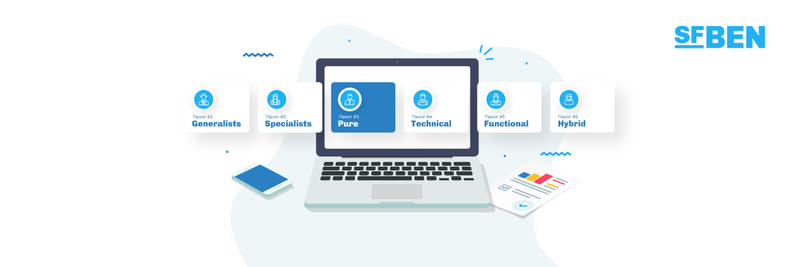

How to Become a Salesforce Business Analyst
“Specifically Salesforce BA, you need to start by knowing what the role entails, the deliverables that we create.
From there, you’ve got to get certified if you want to pursue a path as a Salesforce Business Analyst. Getting at least the Salesforce Administrator certification is a great way to show that you have a base-level understanding of the platform.
Then, pair that with your understanding of what a Salesforce Business Analyst does and the deliverables that we create, I think those two are enough to get people started and down the path.”
Toni V. Martin, Salesforce MVP, Salesforce Business Analyst Advocate.
From Salesforce Admin to Business Analyst
As an organization grows, it typically demands larger and more complex software solutions. At the same time, Salesforce Administrators can find themselves at a career crossroad.
Salesforce Admins looking to broaden their business horizons should consider a role in business analysis. Richard explored the role of a business analyst (BA) from an admins’ point of view – you may be surprised at how much of this they are already doing on a regular basis!
In fact, admins will already be proficient in some of the Salesforce tools that business analysts use in their investigation – including Salesforce Health Check, Salesforce Optimizer, Page Analyzer, adoption dashboards, and surveys.
“Do you like asking “why?” Why is this field here? Why do you need all those values when you only use half? Why, why, why? As a Salesforce Admin, do you find yourself asking why the business is doing this vs. how it’s getting done? If so, you may also find yourself interested in the role of the Salesforce Business Analyst (BA). I recommend looking at Compare the Admin and Business Analyst Roles to give us a side-by-side view of how Admin and BA roles differ.”
CeCe Adams, 22x Certified Solution Architect
“The ‘popular’ Salesforce roles that we see and hear about are admin, developer and architect. Those are roles that everybody is familiar with, what are seen on the billboards at conferences etc.
I think people are becoming interested in what a career in Salesforce business analysis might look like if they don’t want to be an admin, developer, or an architect.”
Toni V. Martin, Salesforce MVP, Salesforce Business Analyst Advocate.
Business analyst transferable skills
Again, what people don’t see is how much business analysis they’re already doing.
You may think : “I talked to the salespeople and they told me what they dislike about Salesforce”. Well, that’s eliciting requirements!
“When I started out, I would see job descriptions and be completely confused. They would be talking about agile. What is agile? JIRA, how do you use that? Is that complicated? I don’t know. Requirements, is there a certain format that these requirements are supposed to come in? I just had no concept of what any of this was.
However, these are things that I’ve created resources for, or I’ve done in different forms, and just didn’t have an official name for them.
So, link what you’ve done to the jargon that makes up the foundational BA building blocks. This will allow you to say: ‘yes, absolutely I’ve elicited requirements! I’ve held stakeholder workshops’.
When you have that understanding of what this really means, and you can translate it into business language, it equips you with a lot of confidence!”
Toni V. Martin, Salesforce MVP, Salesforce Business Analyst Advocate
“I successfully made the transition from utility call center representative into a junior Salesforce Business Analyst role at a small partner company.”
CeCe Adams, 22x Certified Solution Architect
After a career in Pardot/Salesforce consulting, and having spent years absorbing BA-related content running on Salesforceben.com, I thought I’d have a go at the Salesforce Business Analyst Certification.
Then, I reflected on the certification and realized that many of the concepts explored in the certification could make marketers more effective and prominent professionals in their organization – stakeholder management, elicitation, user acceptance testing, and more.
This is a great example of “you’re doing business analysis, you just may not realize it”!
Resources For The SFBA Journey
“The one question I’m asked the most about my Salesforce journey is how I was able to make that shift from Admin/Support work to BA. My answer is always the same: Trailhead, IIBA.org, and networking. Using these in any combination will help you along your path into the world of business analysis”
CeCe Adams, 22x Certified Solution Architect
- Trailhead: The hub for Salesforce education – all for free.
- Salesforce Business Analyst Certification.
- IIBA.org: Guides and best practices for business analysis.
- Networking: For finding new opportunities.
- Salesforce Business Analyst Summit: The only event for and by SFBAs.
Trailhead
Trailhead is the hub for Salesforce education, with thousands of badges geared towards learning new Salesforce skills. Trailhead offers trails such as Get Started as a Salesforce Business Analyst, including a variety of badges on topics such as business processing mapping, and information on Business Analysis career paths.
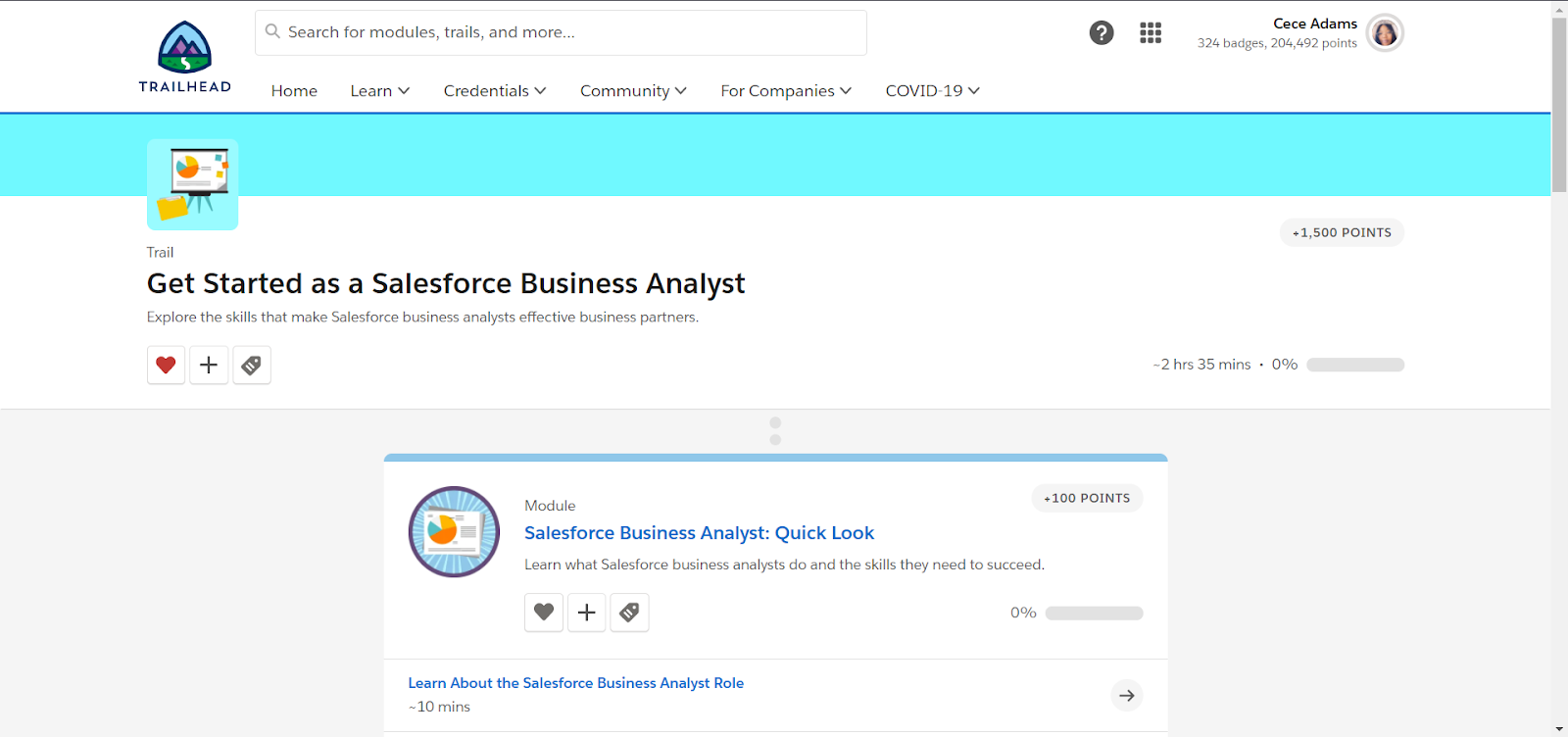

“At the time, Trailhead was a relatively new tool, but I gained as many badges as I could and linked them to my LinkedIn profile; this caught the attention of a recruiter.”
CeCe Adams, 22x Certified Solution Architect
Salesforce Business Analyst Certification
The Salesforce Business Analyst Certification is tailored for individuals who already have hands-on experience and are comfortable following Salesforce best practices – all while using their skills to facilitate project discovery, do process mapping, and write clear and complete user stories.
As one of the new certifications (launched in July 2022), there’s been a lot of excitement as many people have achieved the credential. Salesforce does recommend having at least a couple of years of hands-on experience prior to scheduling this exam, plus the Salesforce Administrator certification is a prerequisite.
The International Institute of Business Analysis (IIBA)
“The International Institute of Business Analysis is a non-profit organization working to create and maintain global standards for the practice of business analysis. In addition to offering the BABOK (Business Analysis Body of Knowledge), they offer certifications for you to flex your BA muscles.
Business Analysis extends outside of Salesforce, so it is a good idea to get a more general understanding of the practice as well. Distinguish yourself with IIBA certifications and position yourself for BA success.”
CeCe Adams, 22x Certified Solution Architect
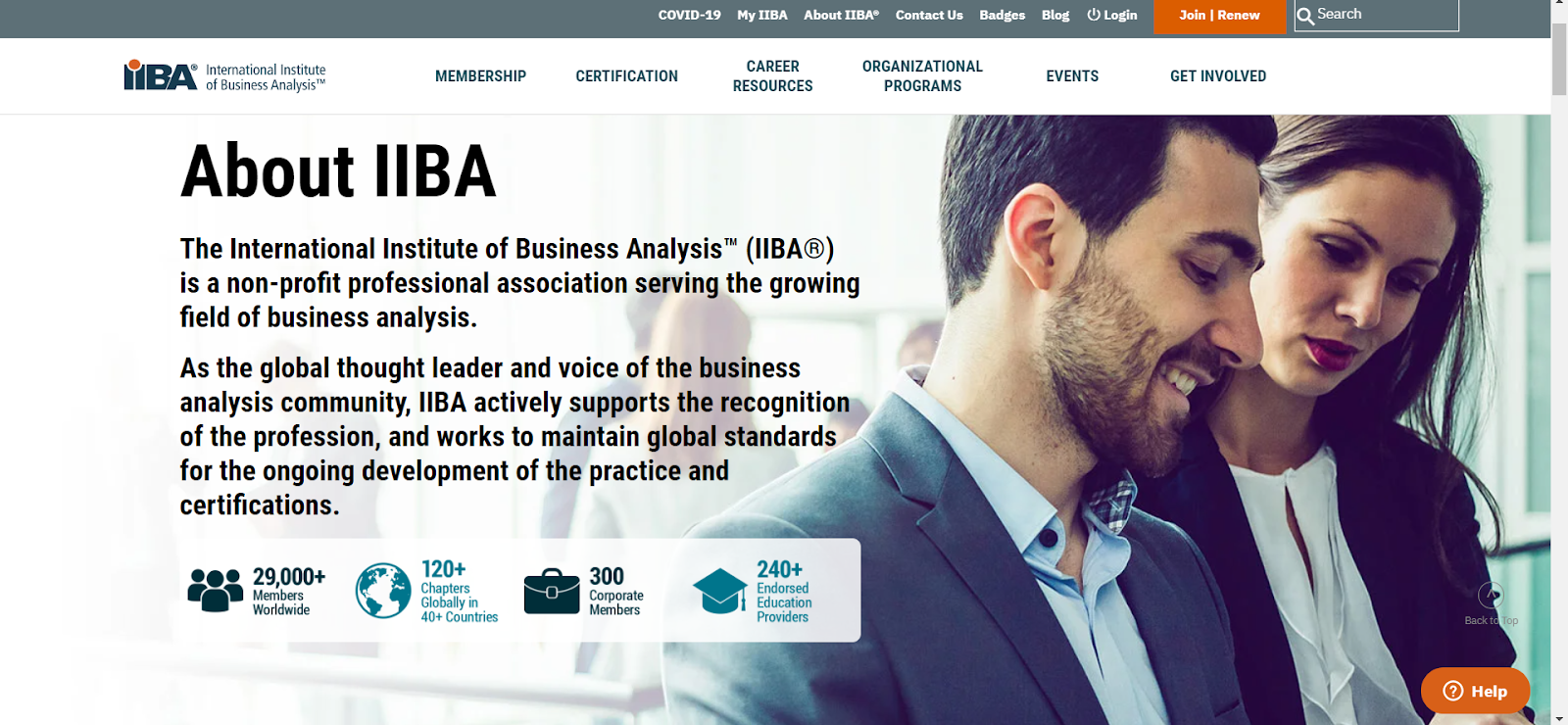

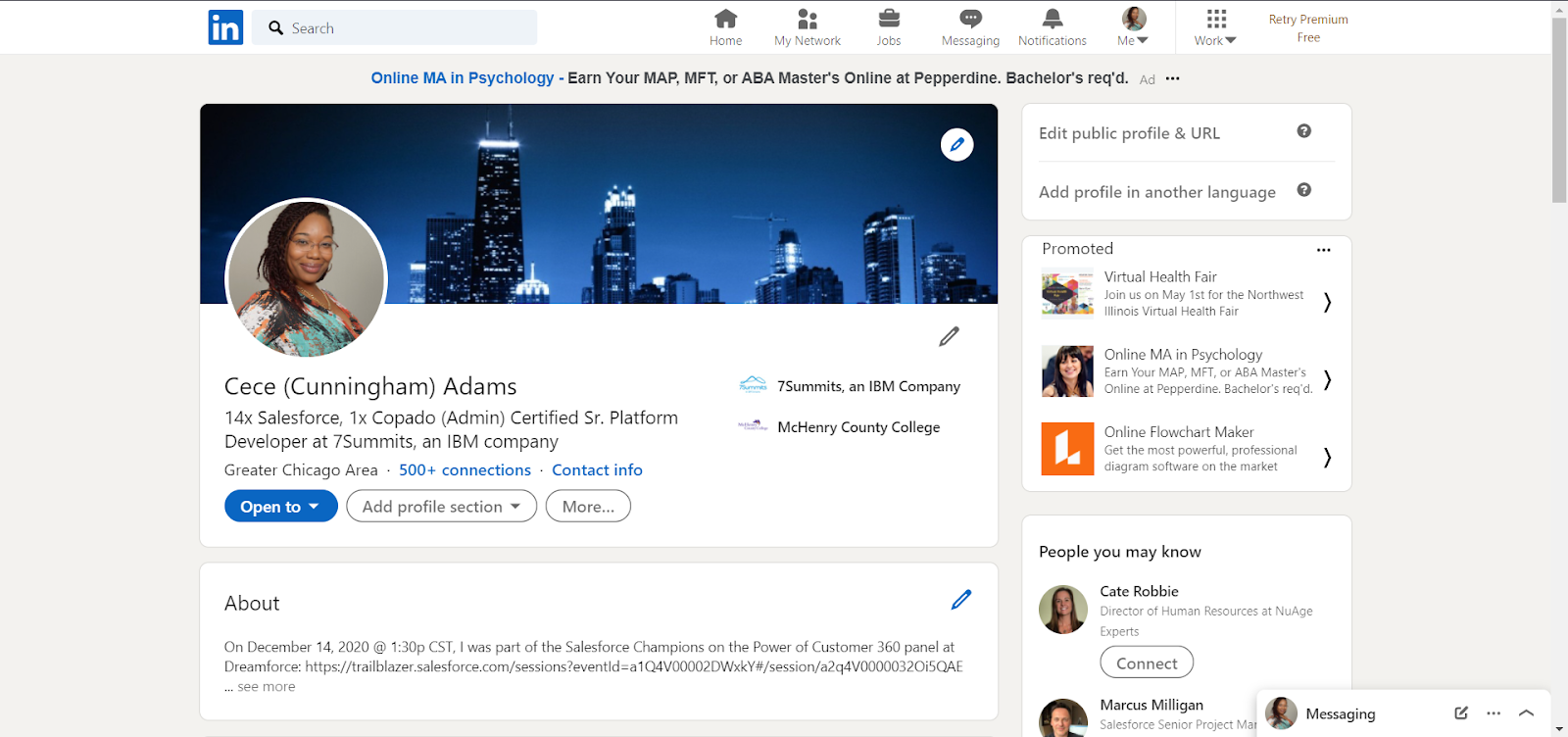

Networking
“Networking. Networking. Networking! This may be scary, especially for my fellow introverts, but it’s a necessary evil. Anyone can acquire Salesforce skills but not everyone can network and use their network efficiently.
I’m not suggesting that you have to have a large number of connections. However, you do want to have meaningful connections. Ones that can vouch for your skills and mention your name in the room when you aren’t there. Those are the people we want to network with.
After my first BA job, it was someone in my network who introduced me to my next opportunity, and then the job after that. That’s the magic that networking can do.”
CeCe Adams, 22x Certified Solution Architect
“In the pre-Trailhead days, I found my local user group meetings and interacted with people to learn about the role because I felt that:
a. I didn’t even know what a Salesforce Business Analyst was or did,
b. I didn’t think I was qualified, and,
c. I didn’t know how to get started.
I networked, pieced together my way through, and got certified.”
Toni V. Martin, Salesforce MVP, Salesforce Business Analyst Advocate
Salesforce Business Analyst Summit
The Salesforce Business Analyst Virtual Summit – the only event for and by Salesforce Business Analysts – takes place annually to help feed the ecosystem’s demand for SFBA-specific content.
It pulls together Salesforce MVPs and thought leaders, everyday BAs who are in the trenches, open up their laptop and let you look over their shoulder, letting you in on how they organize their projects and tips and tricks that have been helpful for them.
Summary
So, you want to become a Business Analyst? What are you waiting for? We hope that this guide has given you an in-depth overview of what Business Analysts do, and some fresh ideas for boosting your BA career momentum.
To finish up, here’s more from Toni’s story to inspire you:
“I was expressing my frustration to Mary Scott, an amazing Salesforce developer and evangelist, saying: “This is the career path that I think is a great fit for me, but I don’t know how to really make myself successful in it”, she responded: “You need to create what you want to see”. I took that to heart, and created the resources that I wish existed when I was starting out.
Over time, I found other people who felt the same way – the thousands of people who have joined my Trailblazer Community groups and the Salesforce Business Analyst summits. It affirmed that other people were looking for resources to help them become or start careers as Salesforce Business Analysts.
That was around a decade ago. It’s a rapid trajectory if you compare it to other career paths! A Salesforce Business Analyst in the US could hit a six figure salary within 3-5 years – that’s unheard of in a lot of industries.”
– Toni V. Martin, Salesforce MVP, Salesforce Business Analyst Advocate.

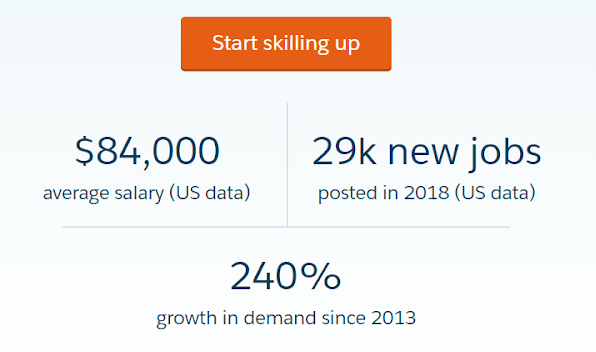
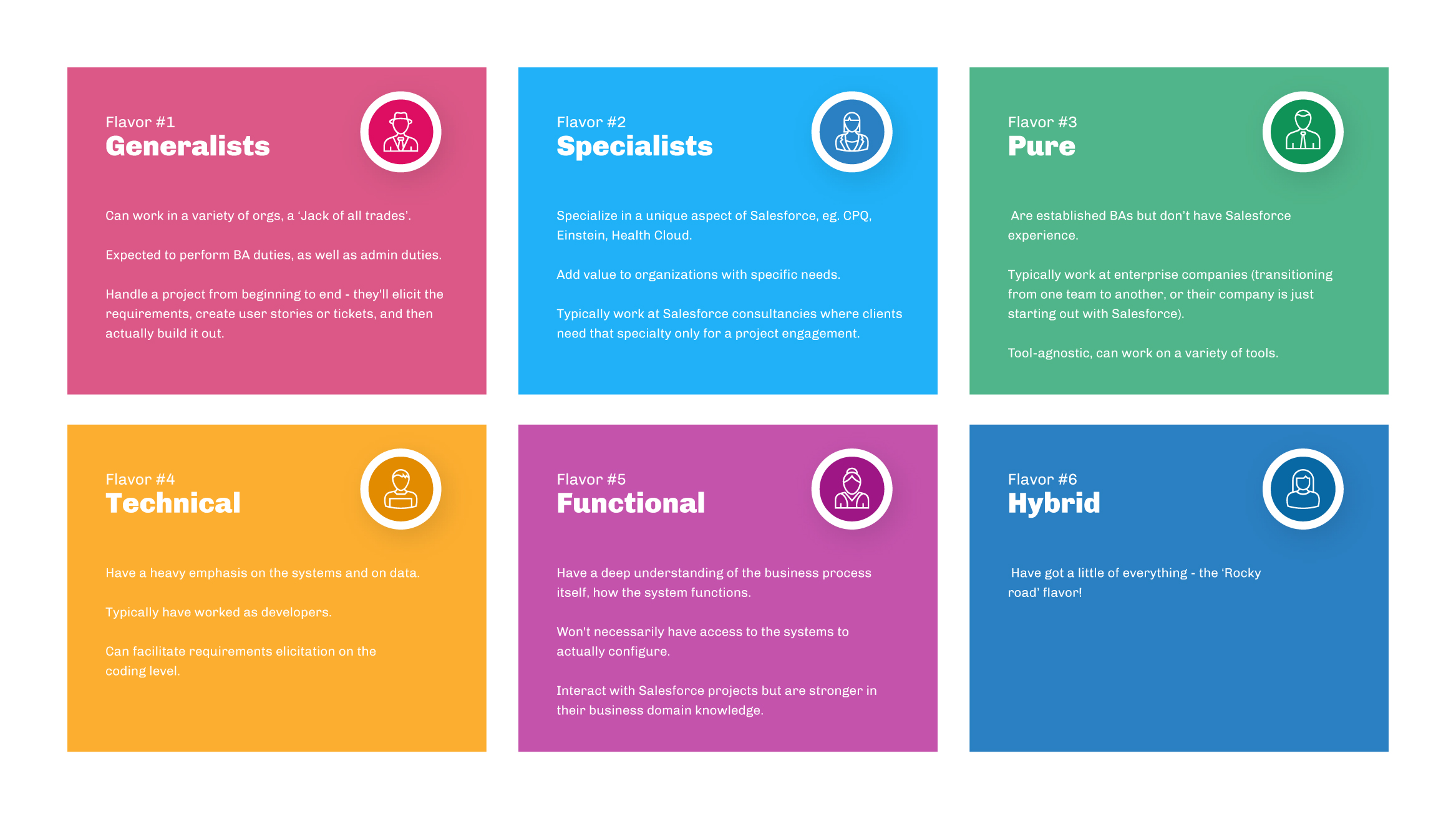


Comments: